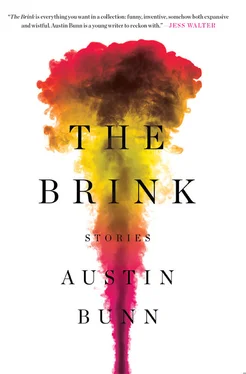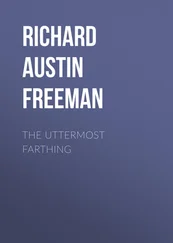Out in the dusk, Henry puts his hand on Jed’s shoulder. With an expectant look, Jed follows Henry’s hand to his face, registering a proposition.
“Am I attractive?” Jed asks.
Henry removes his hand. “Listen, kid, I’m not looking.”
Jed’s face goes flat. “You’re too old anyway.”
It’s such a senselessly cruel thing to say. Henry leaves him, burdened with the tools, thinking, Go ahead and freeze.
Lunch is Spike in a T-shirt and cargo shorts, delivering their pork chops to the table and flexing his biceps. He could be working the leisure deck of a cruise.
“Should we save some food for Rigby?” Ronnie asks.
The question creates a strange quiet. Bodi straightens and Spike goes to him. Seeing them together, for the first time, Henry realizes this is partly what Dawn Manor sells, the miracle they’re there for: two grown men, leaning into each other.
“Rigby passed away,” Bodi says. “She had a stroke two weeks ago.”
“It was horrible and spasmy,” says Spike. “Like, froth was coming out of her mouth—”
“Please, Spike. .” Bodi says. “We’ll see you boys in an hour.”
Spike and Bodi excuse themselves through a door marked “PRIVATE,” their area of the house. A lock slides home.
“Guys,” Ronnie says, “who do you think is cuter? Bodi or Spike?”
Doug crashes his fork to his plate. “We just heard about a fucking dog dying.”
Henry decides he has to leave, before he turns into one of these people. He heads to the porch and finds a corner where his cell gets a single dot of service.
“Is there a sling?” Van asks when he answers.
“No.”
“Oh, I thought for sure there’d be a sling.”
“Jesus,” Henry says. “Listen, I need to get out of here.”
“Is it a cult?” Van says. “Tell me and I’ll get the Better Business Bureau to do an airlift.”
Henry hears, faintly, the clink of ice in a glass. “Are you drinking?” From the quiet he knows that he’s right. But he’s in no position to challenge anyone on their contradictions.
“Mmmm,” Van says. “Survey says yes.”
“Weren’t you supposed to have your son this weekend?”
Van says his ex-wife just informed him she’s moving to Orlando, and that she’s taking his son with her. “Now I realize why people kidnap their children,” Van says. “What’s the jail time on that?”
“We have to look out for each other,” Henry says. “You’re my closest friend.” He winces at the truth of it.
“I know,” Van says, “and I just really feel bad about that.”
Through the living room windows, Henry watches snow streak down, blanketing the lawn. A blizzard is beginning, and for two more days, he’s going to be stuck here with these men trying to pry him open. Bodi hands out dozens of red strips of ribbon. They’re supposed to tie one to each part of their bodies that has experienced a “wounding.” “I did this at a men’s conference in Sedona,” Bodi says, “and by the end, there was just this sea of red.”
Doug throws his ribbons to the floor.
“Nobody said this would be easy,” Bodi says.
“Nobody said this bullshit works,” Doug says. “I’m going out.”
But with the front door wide, Doug stops short at the threshold. “Holy fuck,” Doug says. “You might want to look at this.”
Emblazoned across the door, in red spray paint, are letters. It takes Henry a moment to decode them, and then more time to understand that the graffiti refers to them. “FAGGOTS.” He has never been called a faggot before, and now, in shock, he realizes he is hated for a love that he’s yet to experience. Bodi rushes out to the porch and whispers, “Who the hell. .” The whole front of the house is covered in it, a single brutal streak. Some neighbor kid practicing to use fear, Henry thinks. There’s a call to the police and a terse negotiation about an incident report.
“How long until they get here?” Ronnie asks.
“Not long,” Bodi says.
“Don’t you pay taxes?” Ronnie says. He’s clearly terrified. “There should be fences! Fences and guns!”
“You’re overreacting,” Bodi says.
“Of course I am,” Ronnie says back. “It’s what I’m good at!”
Henry notices Doug has vanished outside, to the lawn. “Should I get him?” During moments of stress, Henry wants assignments, distracting lists. It’s the stage manager in him. Before he’s out the door, Ronnie hands him a can of mace and whispers, “Remember Bethesda.”
Out on the lawn, the snow slants horizontally in the wind. Henry spies Doug a ways up the drive, hammering at the snow break. Henry approaches with his hands in his pockets, like a sullen teen, but he feels a passing moment of luck, as though he has stepped out from underneath a bull’s-eye. He wonders how Bodi will rescue the weekend. At least, Henry thrills to think, they’ll skip the bodywork.
A bright orange flash moves at his periphery and Henry takes an instinctive step back. At the edge of the forest, a hunter emerges from the trees, dressed in camouflage uniform and cap. He carries a goose over his shoulder, its neck twisted like a gunnysack. In his left hand, a double-barrel shotgun points into the ground. The hunter nods to Henry as he turns to a pine tree and unzips his fly.
“You one of the gays?” the hunter calls out, pissing against the tree.
“Yes. .?” Henry says, and the hunter nods. “You didn’t happen to see anyone around this property did you? There’s graffiti all over the house. Just happened.”
The hunter looks back, not bothering to conceal himself on the turn. “Somebody did a little job, eh?” he says, and shakes off, tucking himself back in. “No idea, but I’ll tell you this. You know that dog they had running around here? Getting into people’s business?”
“Actually, I don’t. I just got here.”
“Well, you tell the boys who live here I know who poisoned her.”
“Why are you telling me this?”
The hunter spits something dark and infernal into the snow. “Because everybody’s had a dog. Even if it wasn’t a dog.”
Some bullshit rural koan Henry won’t bother to unravel. He only wanted to slip in and out of this place a better, less-confused person. He never wanted to be a messenger, an actor in anything. The weekend pivots into greater darkness.
“Evening,” the hunter says, and heads back into the trees.
Henry rushes back to the Manor, determined to throw this information off him, rid his mind of it. The dead animal, the graffiti, these aren’t his problems. He has his own pile.
When he reenters the living room, Spike has made a fire.
“I need to talk to you,” Henry says. “I just met one of your neighbors.”
Bodi makes him tell the story twice. Ronnie gasps at every detail until Bodi shoots him a chilling look. A hard rap hits the front door, and the men go silent. Henry’s pulse skips, imagining a mob outside with torches, pitchforks, hoes — rusty, upstate kind of weapons.
“Don’t open the door!” Ronnie yells, and moves behind one of the armchairs. “It’s a trap! I saw this movie!”
“Who is it?” Bodi asks.
“Is this Dawn Manor?” a familiar voice asks. Bodi unlatches the door and the radiator in Henry’s chest takes a kick, fires on. Van walks into the parlor in his corduroy jacket, hiking boots, a long knit cap folded in his hands like an offering.
“Hey,” Van says. “Did I miss the fun part?”
Spike recognizes the hunter by the detail of the beard, a man named Bailey, and calls. Bailey informs him that one of their neighbors, a widow, paid two high school kids to feed Rigby a steak laced with ketamine. Retribution, Henry learns, for some damage the dog caused to a pheasant farm.
Читать дальше











